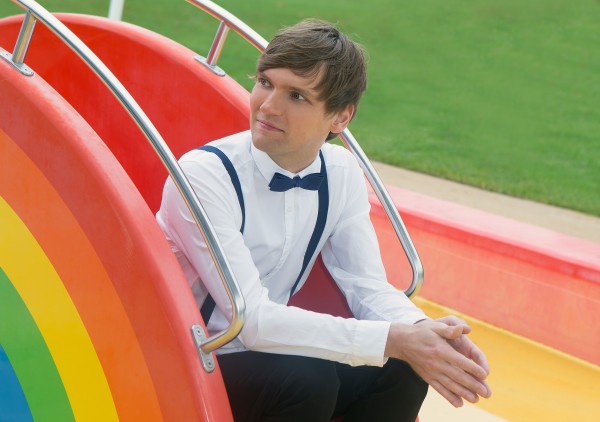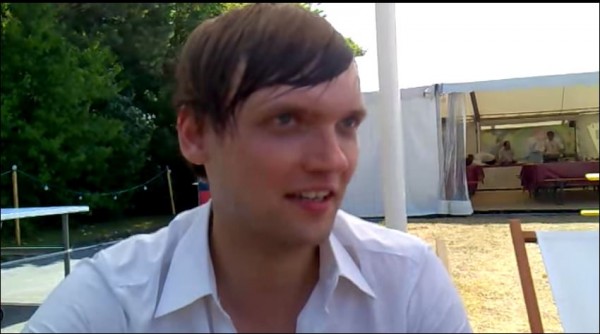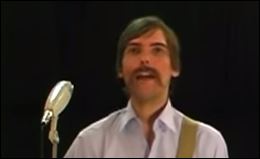“That’s when I realized that we had messed up”
To aficionados of German pop music the mid-noughties presented themselves as gigantic depressing landfill.
The only things left in plain sight were bands like Silbermond and Juli who had in the meantime gone on to being emblematic of a kind of pseudo-romantic neo-liberal pop. Overly emotional, this kind of music revolved around itself and came off more narrow-minded, separatist and desperate to cling on to its status, as the entire works of Heino. Apart from that there was kettcar, but I kind of never got the hang of their lyrics and also did not feel like investing my time in deciphering them. And then there was the incessant lashing out of the second generation of ‘Aggro Berlin’ rappers. Deprived of a certain moment of surprise and the inherent “wow-effect” of the first generation, their work constitutes the ultimate rock bottom in the history of German rap music.
So all of Media-Control was occupied by garbage like that? No, not entirely. A small (three slender boys) band from Augsburg was creating refreshing indie-pop and seemed about to launch a promising career – Anajo! “Monika Tanzband”, “Hotelboy”, “Honigmelone” … all of these songs were flawless hits in their own right – even if, of course, it has to be said that opinions strongly differed when it came to their brand of naïve bubblegum-indie. Characteristic of Anajo’s sound was first and foremost Oliver Gottwald’s slightly odd, yet irresistible voice. When contrary to everyone’s expectations they failed to make the big break, things calmed down and their third record “Drei” was both a flop on the market and upon playing it on the stereo. Anajo decided to call it a day and split up.
But now Oliver Gottwald is about to release his first solo album “Zurück als Tourist” on established German independent record label “Tapete Records”.
Linus Volkmann talked to him about new beginnings, failure, money and what it is like to be gay and (not) stand out in a genre as heteronormative as indie music. Translated by Tanita Sanft.
 The past few years seem to have been fairly quiet for you, at least in terms of the attention you got from the media – what have you been up to during the twenty-tens so far, Oliver?
The past few years seem to have been fairly quiet for you, at least in terms of the attention you got from the media – what have you been up to during the twenty-tens so far, Oliver?
In 2010 and 2011 I was still busy with Anajo – writing songs, recording them, going on tour. When it eventually dawned on us at the beginning of 2012 that Anajo was finished, a sort of identity crisis came over me and I considered whether it might not be time to end my career as a musician once and for all. At some point however, the desire to create came back and I started writing new songs – which was also thanks to my new bandmates. But of course this process remains hidden from the general public up to a certain point.
What became of your two bandmates of Anajo?
They both work full-time in “traditional” professions and both have continued to make a little bit of music on the side. Ingolf has in the meantime become a member of another band and Michi has moved to Hamburg and started a family.
With Anajo, to me it kind of felt that everything had started out so very pop, so easy, so irresistible, when it came to the EP and your debut album. Then however it all became a lot more uptight. To me, personally, the last album even sounded a bit off the mark. Maybe I am mistaken – how did you feel about that?
The ease, which had been characteristic of our debut “Nah bei mir” and above all both our EPs “Tanz Tanz Band” and “Vorhang auf”, did indeed kind of go down the drain to a certain extent. Concerning the songwriting, in my opinion, “Drei” still holds some of the most accomplished pieces that we have managed to release over the course of 13 years as a band – first and foremost “Mann auf dem Mond” or “Meine Wege”. In matters of style and production though, the album did in no way manage to reflect our abilities. When I listen to these records nowadays, this realisation still stings quite a bit.
Around the time of Anajo’s second record – including an Intro-cover story – so around 2007, I genuinely thought that Anajo were about to get to the next level. But somehow that didn’t happen. Hadn’t you thought the same thing back then and were you not disappointed about how things worked out in the end?
Most people had been of a similar opinion – obviously not excluding ourselves here. Of course we tried to remain realistic and at the back of our minds we were well aware of possible failure and the possibility that this might not be the moment of our breakthrough.
At the same time we put all of our eggs into one basket – which was Anajo. The external conditions were basically ideal: lots of press coverage, our taking part in the “Bundesvision Songcontest”, a tour organized by the Goethe-Institut and so on and so forth. We certainly experienced a little bit of a hype, even if varying in degree dependent on the region. It is not as if what we did, did not have any impact: in Munich, Berlin and Augsburg, for example, we had up to 800 people come to see our shows. The big breakthrough, however, did not happen. We were not even too disappointed at that time, we probably didn’t even have time for it. We just kept on playing shows, as if on a high, and our off-days provided us with much needed rest. We only reflected on what had actually happened a lot later.
Was there a moment of crisis before and around the time of “Drei”? Was there pressure emanating from “the market”? Were you too avid for success and still eventually spread yourselves too thin to succeed or did you just decide to let go in the end?
Essentially, the crisis had already begun earlier – with or rather after the second album. Due to the lack of enduring commercial success, it became increasingly harder to keep the band together. In addition to that not all of us were able to ignore the dreaded reality of “I am over thirty now and I really ought to get my act together” any longer. Priorites had begun to shift gradually. The fact that we parted ways with our manager and “fourth bandmember” Alaska Winter at the beginning of 2010, was yet another nail in the coffin of Anajo. It didn’t work out with him anymore – without him even less so. Each one of the three of us had his individual ideas musically, which were partially completely incompatible. We did not manage to create an artistic vision together anymore. I was well aware of the fact that “Drei” would be the last faint shot Anajo had at continuing together. After we had started recording and received the first roughmixes of the tracks, I was just as aware that we had blown it. But that was when it was already too late.
 You are now touring on your own, of course with a band, but technically as a solo artist – is there anything you miss in comparison to your experiences with Anajo? Or maybe anything that is somehow better?
You are now touring on your own, of course with a band, but technically as a solo artist – is there anything you miss in comparison to your experiences with Anajo? Or maybe anything that is somehow better?
I have to admit that the constellations within the groups are of course profoundly different. The best thing about Anajo was certainly the romantic notion of friends hitting the road together. Three inseparable characters, guiding each other unconditionally through thick and thin, never giving up on each other and working together on our one big mutual goal. The way I describe it here is obviously highly idealised, but it was basically like that. On the other hand it was exactly because of us being intensely emotional that we didn’t manage to be professional enough. What I appreciate most about my current status as solo artist, is a degree of liberty I had never known before, which does me a lot of good. Moreover I am fortunate enough to have found amazing bandmates – Marc Frank, Florian Meya and Samuel Heinecker – who I have already established a profound friendship with, even if it is still a different kind of friendship when compared with Anajo.
I really liked Anajo, but I was also quite fascinated by the fact that you, as the singer are gay, in a genre that is rather heteronormative. Did you have to come to terms with being a heartthrob? How did you relate to being desired by the girls even if who they desired basically had nothing to do with you?
I have to admit that in the beginning I honestly didn’t really care too much about it. I above all enjoyed that a lot of people, both boys and girls, liked our music. When after some time it kind of became clear that there seemed to be a certain appeal to us for girls, the need to clarify the situation arose and it became increasingly important to us to take a clear stand.
 How important was it to you to have queer references (“Amsterdam Mann”) and was there a certain degree of strategic consideration to the fact that in your love songs the lyrics do not necessarily reflect that as openly?
How important was it to you to have queer references (“Amsterdam Mann”) and was there a certain degree of strategic consideration to the fact that in your love songs the lyrics do not necessarily reflect that as openly?
Most love songs are sort of written in a neutral way when it comes to that, so that’s what we did, too. A good love song has to be universal. So our decision concerning the lyrics was not really part of a strategy. When it came to placing songs like “Amsterdam-Mann” and “Hotelboy”, some vigorous internal debates started. People strongly doubted that our fans would just accept my coming out to the public like that. To me personally it was never about shouting from the rooftops that I am gay, because to me, it’s a normal part of my everyday life. That I ended up singing about it no matter what, is primarily about being authentic and honest. I did not want to lead our listeners to believe that I am someone who I am not, above all not for reasons of marketing. In hindsight I even think that I should have been more offensive and even more upfront about it and I think, given the opportunity to relive this situation, I would be.
How does that relate to the songs you write for your project as a solo artist?
Obviously being gay is and always will be a part of me. The “Amsterdam-Mann” for example will certainly not leave my side anytime soon – even if I am a solo artist now. On my new album “Zurück als Tourist” this topic is however not featured, at least not prominently. It feels to me as if I am done with this issue for now, as if I have said everything I wanted to say for the moment. I find it quite peculiar that especially in recent times an increasing number of bands, whose members, at least according to my personal knowledge, are not gay, are flirting with homoerotic poses and imagery – presumably because it is fashionable right now. This is on the other hand when the question of how much of that is just strategy arises again. But of course, why not, let them by all means do that. When it comes to me, I might engage with these kind of issues again on my next album.
Is there actually an estimated number of gay indie-kids who felt that Anajo addressed how they felt and therefore felt activated and enabled?
I don’t really know, probably. There is for example a school principle who I met at one of our gigs in 2007. A few days later he came out – at the age of 50, with a wife and two children. He told me that without the inspiration he drew from Anajo and myself he never would have seen it through. On the one hand I felt flattered and validated, but I was also aware of the fact that a family had just been broken up. We’ve all been close friends for years now and I know that everyone has come to terms with it in the meantime and has made peace with it. So that makes it a very beautiful story.
What’s your main source of income nowadays?
Well, I have plenty of things to do right now, with the release of my album and that. Enough work, so that other jobs would not fit into my schedule at the moment, at least not until after the tour in April. Looking at the current balance of my bank account, however, I feel increasingly uncomfortable. If things continue that way then my savings will soon have been spent. I really have to think of something to salvage that soon.
“Alles muss raus” is the title of one of your new tracks. What kind of role does self-marketing and the economy assume nowadays in the life of an artist? What kind of involuntary interplay between these factors does this result in for your life as an artist?
If you have to engage with economic issues or even problems in your everyday life, like most people have to, there’s basically no escaping this subject. And if as an artist you manage to derive interesting aspects for your own art, then I am happy to incorporate them into my own work. We all have to face the reality of living in a society that is throughly commercialized, whether we like it or not. And of course there is no way of getting around having to think about the way you market yourself as a musician or artist. It may be regrettable that – above all in the independent sector – sometimes artists reach their financial limits time and time again, but on the other hand it forces us as artists to be crafty and find creative ways and ideas to counter these unfavourable conditions.











